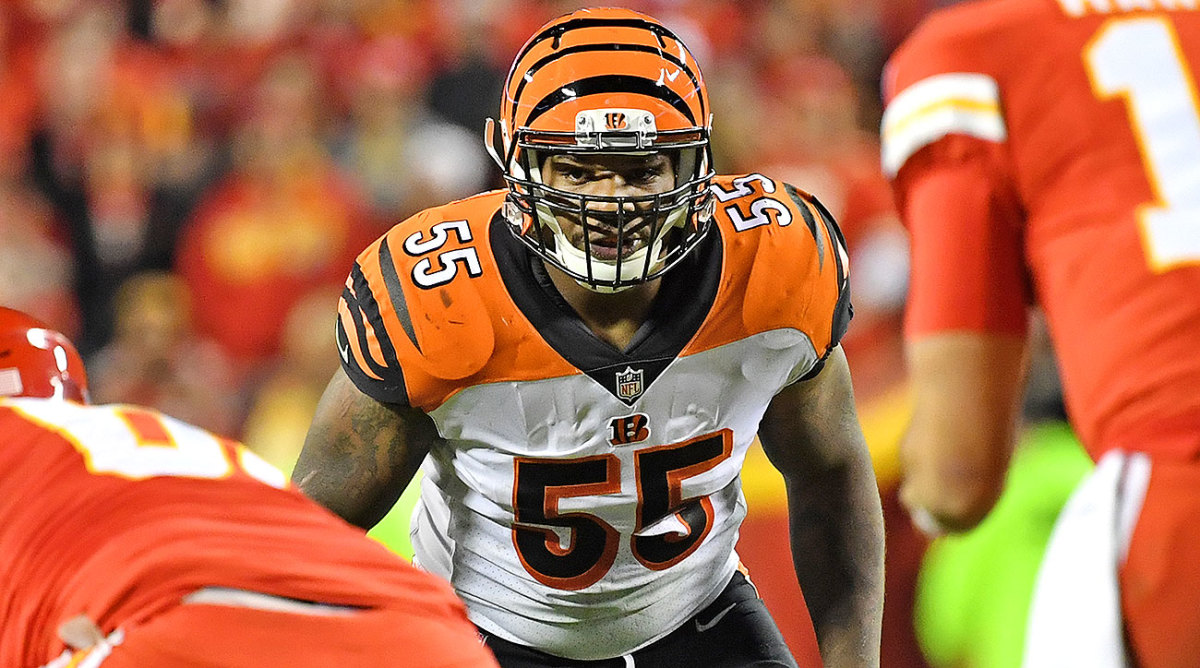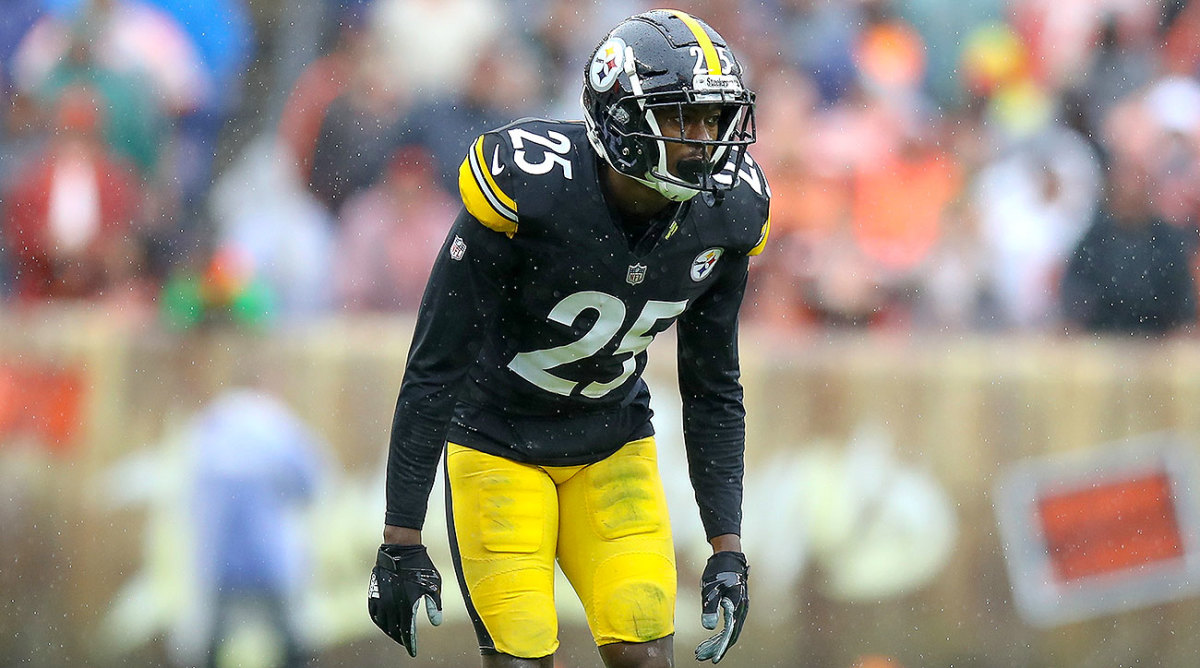Ranking the NFL’s Neediest Teams Ahead of Free Agency and the NFL Draft

This story appears in the Feb. 11, 2019, issue of Sports Illustrated. For more great storytelling and in-depth analysis, subscribe to the magazine—and get up to 94% off the cover price. Click here for more.
1. OAKLAND RAIDERS
2018 RECORD: 4–12 | PRIMARY NEED: DEFENSE | CAP SPACE: $70.7 MILLION (PER OVERTHECAP.COM)
Oakland’s defense rotated players at every position except Tahir Whitehead's middle linebacker spot. (Let that sink in.) Coordinator Paul Guenther prefers zone coverage with two deep safeties, but that only works with a potent four-man rush. Rookie tackles Maurice Hurst and P.J. Hall showed promise, so consider end the top priority (but upgrades are needed almost everywhere).
2. NEW YORK JETS
2018 RECORD: 4–12 | PRIMARY NEED: EDGE RUSHER | CAP SPACE: $90.9 MILLION
Defensive coordinator Gregg Williams runs the sort of attack-minded, multidimensional scheme favored by new coach Adam Gase. But even if they can create pressure with designer blitzes, they'll need a consistent threat from the outside—especially considering that Williams likes to mix things up by using Cover 2, a zone coverage dependent on the four-man rush getting home.
3. ARIZONA CARDINALS
2018 RECORD: 3–13 | PRIMARY NEED: OFFENSIVE LINE | CAP SPACE: $48 MILLION
By the end of his rookie season, QB Josh Rosen had no chance. The O-line, depleted by injuries and mediocre to begin with, was a sieve. Disappointing 2015 free agent Mike Iupati is unlikely to be re-signed, leaving a vacancy at left guard. Because last year's big free-agent signing, right tackle Justin Pugh, is able to slide inside, Arizona can seek the best guard or tackle available.
4. MIAMI DOLPHINS
2018 RECORD: 7–9 | PRIMARY NEED: STOUT DEFENSIVE END | CAP SPACE: $10.2 MILLION
The Dolphins have featured one-gap penetrating D-linemen for years, with underwhelming results. Brian Flores, the Patriots' linebacker coach and de facto defensive coordinator in 2018, became their head coach because they wanted the gap-plugging scheme he learned under Bill Belichick. That means meaty tackles and, more important, stout edge players who can prevent outside runs.
5. WASHINGTON REDSKINS
2018 RECORD: 7–9 | PRIMARY NEED: DEFINED WIDE RECEIVER | CAP SPACE: $17.7 MILLION
With Alex Smith expected to miss 2019 with a right-leg injury, Washington will rely on a rookie or journeyman QB. Coach Jay Gruden, who is great at creating opportunities for receivers through wrinkles in formations and route combinations, needs a receiver with length or speed to build his scheme around. Josh Doctson, a 2016 first-rounder, isn't that guy, and slot maestro Jamison Crowder is a free agent.
6. BUFFALO BILLS
2018 RECORD: 6–10 | PRIMARY NEED: MOBILE GUARD / MOBILE CENTER | CAP SPACE: $79 MILLION
The Bills must use their big, strong, swift QB, Josh Allen, on designed runs behind man-to-man blocking (similar to the ways the Panthers deploy Cam Newton). Success there starts with a mobile guard. Buffalo must find one who can pull-block across the formation, lending dimension to power runs and counters, as well as to play-action passes—tactics that best benefit Allen.
7. SAN FRANCISCO 49ERS
2018 RECORD: 4–12 | PRIMARY NEED: ATHLETIC LINEBACKER | CAP SPACE: $60.6 MILLION
The Niners' defensive scheme gives up completions underneath, so linebackers must have the speed to close on the ball. That's why they drafted Fred Warner in the third round last year and took a chance on Rueben Foster with the 31st pick in 2017. When the Foster gamble backfired, the middle of the D was exposed. A pass-defending linebacker would fix matters and put Warner in more favorable coverage scenarios.
8. TAMPA BAY BUCCANEERS
2018 RECORD: 5–11 | PRIMARY NEED: MULTI-DIMENSIONAL SAFETY | CAP SPACE: $8.5 MILLION
New coach Bruce Arians wants variety and aggression in his defensive scheme, which is why he reunited with coordinator Todd Bowles, who became the NFL's hottest defensive play-caller by the end of his run with Arians in Arizona. Bowles will bring interior blitzes, which take the shortest path to the quarterback and cloud his vision. Safeties are crucial, not just as blitzers but also as man-to-man defenders behind those blitzes.

9. CINCINNATI BENGALS
2018 RECORD: 6–10 | PRIMARY NEED: LINEBACKER | CAP SPACE: $50.4 MILLION
Vontaze Burfict is smart, strong and sound, but he can't run well—a problem because he's Cincy's top nickel linebacker. First-time head coach Zac Taylor is still looking for a defensvie coordinator, after things fell through with Jack Del Rio. Presumably, Taylor wants a flexible zone-based scheme, where you can mix in more man-to-man and designer pressures. That requires at least one 'backer who moves well in open space.
10. DENVER BRONCOS
2018 RECORD: 6–10 | PRIMARY NEED: INTERIOR O-LINEMAN | CAP SPACE: $37 MILLION
Giving pro bowl tailback Phillip Lindsay the ball often can help assuage the question marks at quarterback, but the Broncos need a dynamic guard and a smart center in order to expand their run designs. And there are other factors at work: Guard Ronald Leary is coming off an Achilles injury, Connor McGovern is a backup-caliber guard and center, and banged-up center Matt Paradis is slated to become an unrestricted free agent.
11. CAROLINA PANTHERS
2018 RECORD: 7–9 | PRIMARY NEED: WIDE RECEIVER | CAP SPACE: $19.5 MILLION
The logic behind drafting 6' 5" Kelvin Benjamin in the first round of 2014 and 6'4" Devin Funchess in the second of '15 made sense: Cam Newton sometimes misses high and wide, so get him big targets who have large catch radiuses. While they never lived up to their projections, that shouldn't stop Carolina from trying again. With foot injuries putting soon-to-be 34-year-old Greg Olsen's future in doubt, a big tight end is also in play.
12. NEW YORK GIANTS
2018 RECORD: 5–11 | PRIMARY NEED: CORNERBACK | CAP SPACE: $27.3 MILLION
The Giants will almost certainly let journeyman cornerback B.W. Webb walk in free agency, leaving a hole on the right side opposite Janoris Jenkins, who had a down season. Coordinator James Bettcher loves to blitz (up the middle or from the slot), and with New York's lack of edge rushers, he will rely on those tactics in 2019. Aggressive corners are critical for backstopping blitzes.
VRENTAS: Kareem Hunt Could Have Earned His Way Back into the NFL—But Not This Quickly
13. DETROIT LIONS
2018 RECORD: 6–10 | PRIMARY NEED: WIDE RECEIVER | CAP SPACE: $31.7 MILLION
Matt Patricia wants his offense to feature Patriots-like tactics such as presnap motion, routes that intersect off the line of scrimmage, and stack and bunch releases. With top wideouts Kenny Golladay and Marvin Jones being vertical receivers, a shifty, Julian Edelman--style possession target is in order. The Lions traded Golden Tate midseason, which suggests they want to find a cheaper option through the draft.
14. TENNESSEE TITANS
2018 RECORD: 9–7 | PRIMARY NEED: WIDE RECEIVER | CAP SPACE: $41.9 MILLION
Tennessee can build its passing game around Corey Davis, the much-improved 2017 first-round pick, but his lack of speed inhibits the play designs of OC Arthur Smith. Taywan Taylor has wheels but is better suited for situational duties. If the Titans add a burner—even just a Ted Ginn Jr.--type who can catch most of what you throw at him while threatening safeties deep—then their scheme opens up considerably.
15. BALTIMORE RAVENS
2018 RECORD: 10–6 | PRIMARY NEED: WIDE RECEIVER | CAP SPACE: $21.9 MILLION
The Ravens knew Lamar Jackson would be a project and understand that the 22-year-old QB still has a lot learn about running a full-fledged passing attack. Until he's farther along the learning curve, the receivers will be asked to run simple isolation routes, which forces them to win one-on-one battles. That means you need receivers with fluid hips to separate from defenders or strong hands to make contested catches.
16. CLEVELAND BROWNS
2018 RECORD: 7-8-1 | PRIMARY NEED: EDGE RUSHER | CAP SPACE: $80.1 MILLION
Defensive end Myles Garrett is living up to his promise as the No. 1 pick in 2017, but the Rams' Aaron Donald and the Eagles' Fletcher Cox have shown that it's harder to double-team a great inside pass rusher than a great outsider pass rusher. Garrett, with his quick, violent hands and explosive movement, can be the AFC's top interior rusher. But to move him there the Browns need a couple of more natural edge rushers.
If you want the latest episode of The Monday Morning NFL Podcast in your feed when you wake up Monday morning, then subscribe to The MMQB Podcasts. For non-subscribers, there is typically a soul-crushing lag.
17. JACKSONVILLE JAGUARS
2018 RECORD: 5–11 | PRIMARY NEED: RECEIVING TIGHT END | CAP SPACE: MINUS-$4.3 MILLION
Offensive coordinator John DeFilippo uses the tight end both to unbalance his formations, forcing the defense to show its hand, and to flood the field with three receivers—one deep, one short and one intermediate. On play-action the ball usually goes to the intermediate read, often the tight end. The Jaguars ideally want someone who can mimic what George Kittle did in San Francisco—1,377 yards receiving in 2018.
18. GREEN BAY PACKERS
2018 RECORD: 6-9-1 | PRIMARY NEED: EDGE DEFENDER | CAP SPACE: $35.3 MILLION
Defensive coordinator Mike Pettine's blitz-intensive scheme can manufacture pressure through design, but every scheme has room for an edge bender—especially Green Bay's. Clay Matthews is 32 and unlikely to be retained, Nick Perry is injury-prone and Kyler Fackrell is, to put it kindly, an "effort guy." A versatile edge rusher who can also loop inside would fit best. In other words, a younger Matthews.
19. SEATTLE SEAHAWKS
2018 RECORD: 10–6 | PRIMARY NEED: DEFENSIVE TACKLE | CAP SPACE: $50.5 MILLION
Nose tackle Jarran Reed has surprisingly light feet for being such a low-to-the-ground, 306-pound strongman. He lends juice to the Seahawks' interior pressure, but they could use more, especially given that Pete Carroll prefers to rush only four while keeping seven in coverage. Carroll remembers that his defense years ago was at its best when Michael Bennett was inside, shooting gaps on passing downs.
20. PHILADELPHIA EAGLES
2018 RECORD: 9–7 | PRIMARY NEED: RUNNING BACK | CAP SPACE: MINUS-$16 MILLION
Philadelphia had one of the NFL's most expansive running games in 2017, ranking fourth in yards per carry (4.5). Last year, with Jay Ajayi tearing his left ACL in Week 5 and Darren Sproles missing Weeks 2 to 12 with a pulled hamstring, Philly ranked 30th (4.0). Even if Ajayi and Sproles, both free agents, are retained, a multidimensional three-down back would give the Eagles unlimited options behind their skilled O-line.
JONES: The Offseason Quarterback Moves Each NFL Team Should Consider (If Any)
21. HOUSTON TEXANS
2018 RECORD: 11–5 | PRIMARY NEED: OFFENSIVE TACKLE | CAP SPACE: $64.5 MILLION
Deshaun Watson took 62 sacks in 2018, the most in an NFL season since '06, and was hit an additional 126 times. Tackles Julie'n Davenport and Kendall Lamm were limited pass blockers, compelling coach Bill O'Brien to keep in extra protectors. This invited blitzes and limited downfield receiving options, which forced Watson to hold on to the ball longer. O'Brien can reclaim control of his scheme by finding an offensive tackle he trusts.
22. DALLAS COWBOYS
2018 RECORD: 10–6 | PRIMARY NEED: SLOT RECEIVER | CAP SPACE: $46.1 MILLION
Cole Beasley IS a free agent who may have burned his bridges in Dallas by criticizing the front office early this offseason. Tavon Austin is also a free agent and could draw decent interest given the rising popularity of jet sweeps. Finding another Beasley, who had the body control and understanding of defensive leverage to consistently separate underneath, is critical to continue the development of quarterback Dak Prescott.
23. MINNESOTA VIKINGS
2018 RECORD: 8-7-1 | PRIMARY NEED: MAULING GUARD | CAP SPACE: $ 6.9 MILLION
Pounding the rock the way coach Mike Zimmer wants to do requires guards who can move the line of scrimmage. That’s even more important when your center is Pat Elflein, who relies on agility more than brute strength. Incumbent left guard Tom Compton is a free agent. On the right, former Panther Mike Remmers has not progressed as he did at tackle, where he played his first five NFL seasons.
24. INDIANAPOLIS COLTS
2018 RECORD: 10–6 | PRIMARY NEED: PASS RUSHER | CAP SPACE: $109 MILLION
Indy’s defense overachieved in 2018 by mastering coordinator Matt Eberflus's fundamentally sound zone scheme, which he then expanded with slot and linebacker blitzes down the stretch. In the playoff loss at Kansas City, however, the defense failed to get off the field because of an impotent four-man rush—a long-simmering issue. A talented pass rusher, inside or outside, can make this defense great.

25. PITTSBURGH STEELERS
2018 RECORD: 9-6-1 | PRIMARY NEED: CORNERBACK | CAP SPACE: $19.3 MILLION
Artie Burns, a 2016 first-rounder, is a liability as the No. 2 corner. Respectable journeyman Coty Sensabaugh can mask the problem by replacing him, but to fix it the Steelers need a true perimeter cover artist opposite star Joe Haden. This would let them play less pure zone and more of the matchup coverages that are demanded against the elite AFC QBs who run cutting-edge offenses in New England, Kansas City, Los Angeles and Indy.
26. CHICAGO BEARS
2018 RECORD: 12–4 | PRIMARY NEED: SAFETY | CAP SPACE: $7.3 MILLION
Just one base 4–3 starter is scheduled for free agency: free safety Adrian Amos. If he's retained, the Bears could still add depth, because they use safeties deceptively to confuse QBs about which zone coverage they're seeing. With Khalil Mack (left) providing a pass rush, these schemes have produced more turnover opportunities, making ball skills that much more important for a DB.
27. LOS ANGELES RAMS
2018 RECORD: 13–3 | PRIMARY NEED: EDGE RUSHER | CAP SPACE: $23.8 MILLION
Ndamukong Suh had a strong postseason and Dante Fowler Jr. made enough splashy plays to justify acquiring him midseason, but there's a chance neither will return to the NFC champions. A pliable edge rusher to pair with the back-to-back Defensive Player of the Year Aaron Donald would do wonders—especially considering that if they're aligned side by side, at least one will face solo blocking.
28. KANSAS CITY CHIEFS
2018 RECORD: 12–4 | PRIMARY NEED: PLAYMAKING CORNERBACK | CAP SPACE: $26.4 MILLION
Defensive coordinator Steve Spagnuolo likes to blitz, especially with a slot cornerback and a linebacker. This requires corners who can survive one-on-one, though they don't have to be true iso-cover artists. Spagnuolo will keep two safeties deep when blitzing, giving corners help inside. A corner who can read and jump routes becomes key. Think someone like the Giants' Janoris Jenkins, who had three picks under Spagnuolo in 2017.
STAFF ROUNDTABLE: Which Teams Will Win the Next Five Super Bowls?
29. NEW ENGLAND PATRIOTS
2018 RECORD: 11–5 | PRIMARY NEED: PERIMETER WIDE RECEIVER | CAP SPACE: $16.1 MILLION
Remarkably, the Pats have thrived for years without a deep-threat wideout. Still, that's a hard way to live, which is why they took a chance (that didn't pan out) on Josh Gordon in Septembere. Tight end Rob Gronkowski remains viable, assuming he returns, but not all defenses still respect his receiving. Tom Brady, who loves throwing in-breaking play-action routes, needs a weapon who consistently challenges opponents from the outside.
30. NEW ORLEANS SAINTS
2018 RECORD: 13–3 | PRIMARY NEED: FLEXIBLE TIGHT END | CAP SPACE: $9.3 MILLION
Alvin Kamara’s versatility creates favorable mismatches for the running back—and for those around him. Imagine defending this offense if, alongside Kamara, there were a versatile tight end to worry about. No defense has enough athleticism at safety and linebacker to survive that, especially with Drew Brees distributing. Replacing the retired Ben Watson with a Jimmy Graham--type weapon would make this offense unstoppable.
31. LOS ANGELES CHARGERS
2018 RECORD: 12–4 | PRIMARY NEED: THREE-DOWN LINEBACKER | CAP SPACE: $18.4 MILLION
Defensive coordinator Gus Bradley's unconventional decision to play seven defensive backs in the wild-card win over the Ravens was shrewd. Top linebacker Denzel Perryman (now a free agent) was injured, and the depth behind him wasn't inspiring. In Bradley's scheme, predicated on simple zones that let defenders play fast, linebacker is too important to fill with rotational players.
32. ATLANTA FALCONS
2018 RECORD: 7–9 | PRIMARY NEED: PASS RUSHER | CAP SPACE: $25.2 MILLION
You can‘t have too many pass rushers, even if you drafted one in the first round in 2015 (Vic Beasley, left) and another in '17 (Tak McKinley), and are also likely to re-sign Grady Jarrett, an excellent gap shooter inside. But these three, though gifted individually, are collectively inconsistent. Dan Quinn's simple but detailed 4–3 scheme only works if the four-man rush is getting to the QB.
Question or comment? Email us at talkback@themmqb.com.
